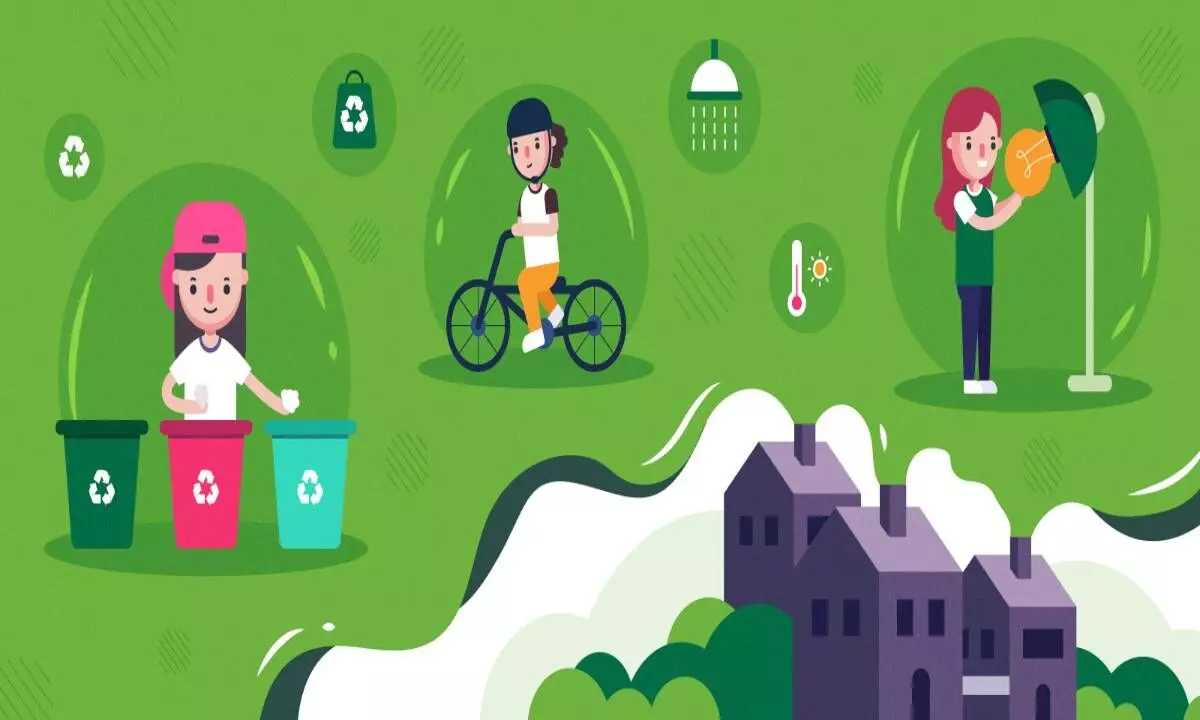The road to sustainable development is in your hands; use energy wisely
Cutting food waste will reduce carbon footprint by 300 kg of CO2e per year
image for illustrative purpose

The Sustainable Development Goals spell out how we can protect our environment and slow climate change, from forests to oceans and everywhere in between. Think about your electricity use and your travel. Check your dinner table. Reuse whatever you can. The possibilities for action are many and they add up fast.
Greenhouse gas emissions per person vary greatly from country to country. In the United States, emissions in 2020 (the latest available data) were 14.6 tons of CO2-equivalent per person – more than double the global average of 6.3 tons, and six times the 2.4 tons per person in India.
Much of our electricity and heat are powered by coal, oil and gas. Some of the workable measures include using less energy by reducing your heating and cooling use, switching to LED light bulbs and energy-efficient electric appliances, washing laundry with cold water, or hanging things to dry instead of using a dryer. Improving energy efficiency at home through better insulation, for instance, or replacing your oil or gas furnace with an electric heat pump can reduce carbon footprint by up to 900 kilograms of CO2e per year.
Ask your utility company if your home energy comes from oil, coal or gas. If possible, see if you can switch to renewable sources such as wind or solar. Or install solar panels on your roof to generate energy. Switching from oil, gas or coal-powered energy to renewable sources of energy can reduce the carbon footprint by up to 1.5 tons of CO2e per year.
If you plan to buy a car, consider going electric, with more and cheaper models coming into the market. In many countries, electric cars help reduce air pollution and greenhouse gas emissions than gas or diesel-powered vehicles. But many electric cars still run on electricity produced from fossil fuels, and the batteries and engines require rare minerals that often come with high environmental and social costs. Switching from a gasoline or diesel-powered car to an electric vehicle can reduce your carbon footprint by up to two tons of CO2e per year. A hybrid vehicle can save you up to 700 kg of CO2e per year.
Airplanes burn large amounts of fossil fuels, producing significant greenhouse gas emissions. That means that taking fewer flights can help reduce your environmental impact at a faster pace. As far as possible, meet virtually, take a train to attend the meeting, or skip that long-distance trip altogether. Taking one less long-haul return flight can reduce your carbon footprint by up to almost two tons of CO2e
Electronics, clothes, plastics and other items that we all buy and use cause carbon emissions at each point in production, from the extraction of raw materials to manufacturing and transporting the goods. To protect the climate, buy fewer things, shop second-hand, and repair what you can. Plastics alone generated 1.8 billion metric tonnes of greenhouse gas emissions in 2019 – 3.4 per cent of the global total. Less than 10 per cent is recycled, and once plastic is discarded, it can linger for hundreds of years. Buying fewer new clothes – and other consumer goods – can also reduce your carbon footprint. Every kilogram of textiles produced generates about 17 kg of CO2e. Shifting from a mixed to a vegetarian diet can reduce carbon footprint by up to 500 kg of CO2e per year (or up to 900 kilograms for a vegan diet).
Purchase only what you need, use what you buy and compost any leftovers. Cutting your food waste can reduce your carbon footprint by up to 300 kg of CO2e per year.
If you have a garden or even just a plant or two outside your home, check for native species. Use a plant identification app to help. And then think about replacing non-natives, especially any considered invasive.
Humans, animals and plants all suffer from land and water contaminated by improperly discarded garbage. Use what you need, and when you have to throw something out, dispose them properly. Educate others to do the same, and participate in local clean-ups of parks, rivers, beaches and beyond. Every year, people throw out two billion tons of trash. About a third causes environment harms, from choking water supplies to poisoning soil.
Everything on which we spend money affects the planet. You have the power to choose which goods and services you support. To reduce your environmental impact, choose products from companies, which use resources responsibly and are committed to cutting their gas emissions and waste.

